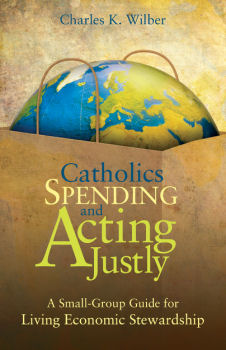
|
Posted June 23, 2011
Book: Catholics Spending and Acting Justly: A Small-Group Guide for Living Economic Stewardship Author: Charles K. Wilber Ave Maria Press. Notre Dame, IN. 2011. Pp.82 An Excerpt from the Jacket:
A clear but challenging “see, judge, and act” process for small groups to use in response to the economic challenges of everyday life. If taken seriously, this small booklet could change our lives, our communities, and our world. An Excerpt from the book: The Crucial Role of Economic Theory Economic theory can provide an analysis of which policies might or might not work in achieving a desired economic goal. At the core of this analysis is a model of competitive market capitalism in which it is assumed that an uncoerced person can be depended upon to act rationally in maximizing his or her individual self-interest. Free individual choices are expected to overcome scarcity and result in people getting what they want (limited by their ability to pay) through the automatic adjustments of free exchange (buying and selling) in markets. The forces of competition ensure that the economy produces the goods that people desire and that those goods are produced in the most efficient way. Of course, economists and casual observers alike easily recognize that this is too simple. Markets do not work so neatly. Competition is limited by large monopolistic business firms; by lack of knowledge and due concern on the part of workers, consumers, and investors; and by many other factors of production, but while capital flow overseas, labor cannot follow. The result is structural domestic unemployment, at least in the short run. Market outcomes are also distorted by the presence of “externalities” such as environmental costs. If in the act of producing automobiles, waste is dumped in a river and the people downstream have to clean up the spill, those costs are not captured in the market price of the car. This can result in a price that is too low because the cost of cleaning up the pollution is not included. More automobiles will be sold as a result of this than if the price reflected the true costs. The resulting economic model, modified by these real-world phenomena, becomes very complicated and difficult to apply in any simple way. But let’s try using three examples. 1. What is the best way to provide reasonable housing for the poor? Some think it is to use rent-control laws, meaning laws that fix rents below what results from the free market. However, economists argue that this is the worst way to do it. Why? Economic theory predicts that when the price of anything goes down, buyers buy more and sellers supply less. If the rent-controlled price is below what the market price would have been in its absence, then demand for housing will increase and eventually exceed the supply. All sorts of bad things can result. The excess demand can lead to corruption such as charging under-the-table payments. The lower fixed rent will lead some potential landlords to withhold housing from the market because the return on their investments will be less. This, of course, results in a reduction in the stock of affordable housing for the poor. Some landlords will cut up their housing units into several pieces to get around the law. Others will stop maintenance because the lower fixed rent does not yield sufficient profit. Most economists argue that if you do not like market results, you need to interfere in a way that does not make matters worse. So, for example, in the case of housing for the poor, a better way is to subsidize the poor with vouchers so that they can rent in the open market. The only requirement of the landlord is to meet local building codes. Giving renters more to spend encourages landlords to supply additional housing. Table of Contents: 1. Our call to economic stewardship 2. The dignity of the human person 3. Community and the common good 4. Rights and responsibilities 5. The option for the poor 6. The dignity of work 7. Solidarity 8. Subsidiarity Opening prayers Closing prayers |
|
